The Happiest and Unhappiest Myers-Briggs® Personality Types
Can your Myers-Briggs® personality type indicate how happy or unhappy you will be in life? Does your overall life satisfaction decline based on your personality type? Today we’re going to look at some of the research done relating type to overall happiness. But before we delve into all of this, I want to make one big disclaimer:
While Statistics Show Correlations Between Type and Happiness, Your own Happiness Might Not Match the “Norm”
I’ve known many people who contradict the correlations found in the studies relating type to happiness. You can build a happy life regardless of your personality type. This article is just going to show some of the trends and it’s also going to give you some tips for increasing your overall happiness!
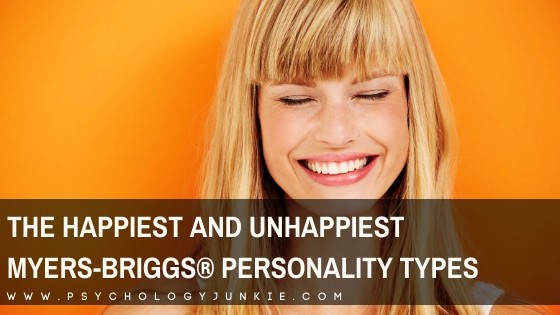
According to the MBTI® Manual, a global sample of 15,824 individuals were asked to indicate, using a 4-point scale from “not at all happy” to “very happy,” their general level of happiness. The results of this survey were fascinating and showed some interesting links between personality type and overall happiness.
The Eight Happiest Myers-Briggs Personality Types
The eight personality types that ranked themselves the happiest were:
#1 – ESTJs
#2 – ENTJs
#3 – ESFJs
#4 – ESFPs
#5 – ENFJs
#6 – ENTPs
#7 – ESTPs
#8 – ENFPs
But why would these types be happier than their introverted counterparts? Well, according to a case study conducted by Larsen and Ketelaar extraverts are more responsive to rewards, which makes them happier overall.
In a 2011 study by Ryan Howell, a psychologist at San Francisco State University, it was discovered that “highly extroverted people are happier with their lives because they tend to hold a positive, nostalgic view of the past and are less likely to have negative thoughts and regrets.” In fact, in a study of over 754 undergraduate students, Howell found that extroverts were more likely to recall positive things from the past while downplaying the negatives.
Richard Depue, a professor of human development at Cornell University, also found that extraverts produce a stronger dopamine response to the memories of their rewards.
“Rewards like food, sex and social interactions as well as more abstract goals such as money or getting a degree trigger the release of dopamine in the brain, producing positive emotions and feelings of desire that motivate us to work toward obtaining those goals. In extroverts, this dopamine response to rewards is more robust so they experience more frequent activation of strong positive emotions,” – Richard Depue, professor of human development in the College of Human Ecology at Cornell University
Another factor that might play a part in the happiness of extroverts is that for a long time Western culture has favored extroverted personalities. People who act quickly, appear friendly, sociable, and outgoing are often praised or seen as the “norm.” Introverts often feel like they have to wear an extroverted persona in order to make a positive impression or fit in. This can lead to increased anxiety or lower self-esteem for introverts as a result.
What did Isabel Briggs-Myers have to say?
Myers believed that IP types were going to be less satisfied than Extraverts and Judging types. She found that IPs tended to perceive external difficulties more fully than EJs did. According to the MBTI® Manual, “They are in the habit of using their perceiving process in the outer world. They assume that there is more to be seen than they have seen so far, that some of those things may not be pleasant or favorable, and they make a point of looking for those things.”
The Manual also says that because introverts have more interest in their inner world they tend to be more aware of internal difficulties than extraverts are.
Which Types Ranked as the Least Happy?
According to the MBTI® Manual, these types ranked themselves as the least happy:
#1 – INFPs
#2 – INTPs
#3 – INFJs
#4 – ISFPs
#5 – ISFJs
#6 – ISTPs
#7 – INTJs
#8 – ISTJs
Sadly, INFPs ranked the lowest for happiness as well as the lowest for life-satisfaction. According to the third edition of the MBTI® Manual, these types also ranked second highest in dissatisfaction with their marriages and intimate relationships.
INTPs, who ranked as the second-to least happy type, were also over-represented among males with post-traumatic stress disorder. They also ranked 15th out of the 16 types in using both cognitive and social coping resources to deal with stress.
INFJs, who ranked third-to-last, ranked highest of all 16 personality types in being dissatisfied with their marriages and intimate relationships. They also ranked highest in reporting stress associated with work, intimate relationships, and school.
ISFPs ranked highest in emotional exhaustion and depersonalization. They also ranked highest in reporting stress associated with finances and children.
All of this information can be found in the MBTI® Manual – Fourth Edition and the MBTI® Manual – Third Edition.
So What Can We Do About these Results? How Can We Be Happier?
It’s important to remember that there is no “good” or “bad” personality type. Each type has something significant to offer the world. Each type has strengths that are all their own.
What we can learn from these studies and statistics:
#1: We shouldn’t beat ourselves up (or others) for their levels of happiness. There is something clearly bigger at play here than a mere desire to be in a bad mood.
#2: We need to look for the kinds of experiences that bring us joy – and that will be different depending on our type. Our type doesn’t dictate our happiness.
#3: Introverts may be at a disadvantage in a culture that prizes extroverted behavior. This trend may be changing, however, as introversion is becoming more respected thanks to activists like Susan Cain and Jenn Granneman. Either way, it’s important for parents, employers, and school teachers to appreciate their introverted friends, employees, children, and students. Less pressure to be an extrovert will likely increase the happiness level of introverts around the world.
What Really Does Create Happiness?
There’s more to being happy than having the right four letters in your personality type! What really makes people happy? What experiences bring individuals real joy and meaning? Some things will vary for each personality type. But researchers like Ed Diener and Sonja Lyubomirsky, are helping to shine a light on what happiness really means.
Money and genetics only play a very small role.
When Ed Diener, a Distinguished Professor of Psychology, compared the people on the Forbe’s list of wealthiest Americans with the general population, he found that they were only slightly happier than average. In fact, 37% of the individuals surveyed were less happy than the average American.
Here Are Some Simple Ways to Take Control of Your Happiness:
- Keep a gratitude journal. Every night before you go to bed, write down three things you are thankful for. When you wake up, write down at least two more things.
- Forgive yourself and others. Carrying around guilt, regret, and anguish will only weigh you down. You’re punishing yourself for the same failures over and over again, and that’s an exercise in futility. Learn to forgive and have compassion for yourself.
- Have goals. Maybe you have a big goal like earning six-figures in a year. Maybe your goal involves spending 30 minutes outside each day. Whatever it is, pursuing goals and having goals makes you happier.
- Meditate. Spending even 15 minutes a day meditating can regulate your mood, reduce stress, and calm your soul.
- Exercise. Being active helps to release endorphins in your brain that decrease stress and improve your overall well-being.
- Get enough sleep. When you aren’t getting enough sleep your concentration, memory, and mood all suffer.
- Spend time on meaningful relationships. Whether you meet up with a friend for coffee or do a Skype call with your parents, spending time with friends and people who care about you is medicine for the soul.
- Be altruistic. Spending money on other people and putting your time towards altruistic activities can greatly increase your happiness and life satisfaction.
- Laugh. Break out the comedies, listen to your favorite comedians, or simply find the humor in everyday situations. Laughing strengthens your immune system, boosts your mood, diminishes pain, and protects you from the damaging effects of stress.
- Spend money on experiences over things. Material goods that are non-essential only buy short-term happiness. Put your money towards experiences so that you can build up your memory bank with positive images and increase your life-long happiness as a result.
- Get help. If you’re struggling with depression, anxiety, or mental illness your happiness can be strongly affected. Getting in touch with a trained, certified therapist can help you to deal with underlying issues that are affecting your happiness.
What Are Your Thoughts?
How do you bring happiness into your life? What suggestions would you have for other people with your personality type? Let us know in the comments!
Find out more about your personality type in our eBooks, Discovering You: Unlocking the Power of Personality Type, The INFJ – Understanding the Mystic, and The INFP – Understanding the Dreamer. You can also connect with me via Facebook, Instagram, or Twitter!
Other Articles You Might Enjoy:
Here’s What Gives You a Sense of Magic and Meaning, Based on Your Personality Type
Here’s How You Intimidate People, Based on Your Personality Type
Subscribe to Our Newsletter

Want to discover more about personality type? Get the inside scoop with Susan Storm on all things typological, along with special subscriber freebies, and discounts on new eBooks and courses! Join our newsletter today!


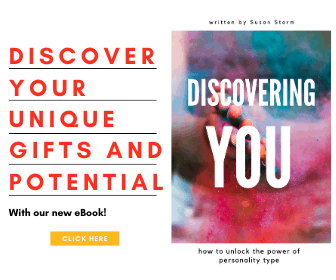
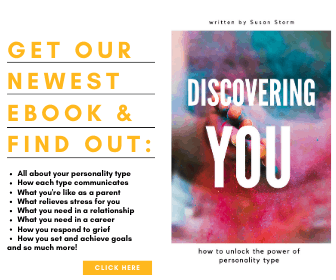





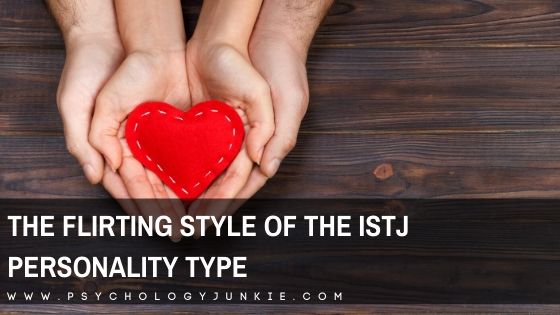
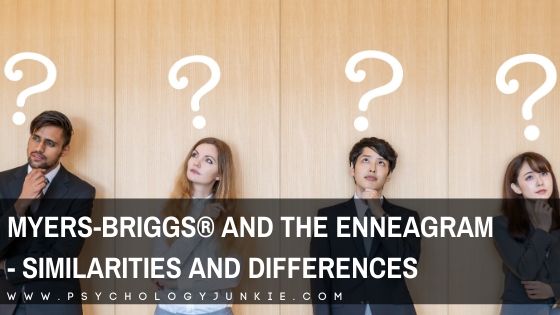




As an INFP/INFJ I totally and completely disagree with the findings in the study. I am very happy, I love my life. I have a very happy marriage. Introverted people are NOT all gloom and doom and woe is me. We are just not always as vocal or expressive about showing our happiness. Honestly, just by overhearing conversations going on around me by people I know well… I seem to be happier by far than the majority of them. Perhaps it is because I have learned what makes me happy and to pursue that rather than try to fit into a mold or idea that someone else tells me would bring me joy.
Hi Roxie!
I definitely don’t think all INFPs/INFJs (or introverts for that matter) are unhappy. If you read the article in detail you’ll see that I explain that the people who were given the questionnaire were simply asked to rank on a scale of 1-4 how happy they were “Very happy” to “Very unhappy”, etc,. From the sample size given of 15,824 individuals, these types just ranked themselves lower in happiness than the other types. This doesn’t mean that everyone of that type is unhappy – it just shows a trend. I definitely believe that a lot more goes into happiness than type!
I’ll admit I was afraid to read this article, as I had a feeling my type would be on the bottom of it. As a person who is obsessed with Myers-Briggs and also understanding what makes people happy, I’m not surprised by these results. The people around me who seem to be the happiest, are the 1) Extroverts and 2) the Planners. If relationships are the key indicator of one’s happiness, it’s no wonder the people who keep busy social calendars have the strongest relationships. I’m an INTP and would prefer to stay at home and do my own thing, but as an attractive, fortunate mother of two young children, feeding my introverted carefree desires are simply not in my cards. People around us want to get to know us, socialize, etc… I’m thankful for my extroverted planning pack of women who constantly motivate me and plan my weekends. Oh and that gratitude bit you mentioned, it’s SO TRUE. It’s the thing that sets apart the doers versus the complainers. As always, thanks for your awesome newsletters. You’ve taught me so much!
What I would take from this study, is IPs have a lot of negative thoughts associated with public situations, then bc they internally dwell on the negative in their own world, it adds anxiety to it. The question it would lead me to next is, how would positively manufactured pubic scenarios/settings affect their happiness levels. Is it matter of not being guided through tough moments of childhood.
What’s your definition for happiness? Without a definition for happiness it’s impossible to judge whether a person is happy or not. One person is perfectly happy sitting in a dark room contemplating the theories for how the multiverses interact. Another person is not happy unless engaged in a lively game of their favourite sports. I’ve been told many a time that I’m too pessimistic and serious. But this evaluation of me was so far off-target as to be laughable. I was eagerly following my curiosity into the nooks and crannies of the unknown. I’m happiest when I’m seriously doing this. I become anxious, agitated, and depressed when these natural searchings are disrupted with these baseless accusations. In my natural seeking for information to solve social questions, I’ve been told not to think so much, to just have some fun. That, too, makes for frustration and anxiety, the opposite of happiness. I’m INTJ.
It surprises me that ENFP only ranks #8! I thought I’m the happiest person in earth! haha!
I guess I am the rarest of the rare because I am a very happy INFP. Laughter, spending money on experiences instead of things, all of the advice is good. Ultimately, we are in charge of our own happiness.
My INFJ perspective. Who wants to be happy all the time? I’d much rather enjoy being happy when there’s something meaningful to be happy about. The down times make the good ones that much better and are appreciated more. Definitely preferable to going through life in a “Glenda the good witch” bubble.
I’m an infp male (on tests that measure percentages, I’ve tested as 100% feeler, which is sort of a problem in my marriage btw lol ((to an infj)). The curious part to me is that all of the literature that I’ve read concerning personality types generally seem to list INFPs as the kindest or the softest of spirits or some variation of. Not that the two must co-exist together but it seems there should be a correlation, right ? Is this more to do with the expectations that the INFP personality type have ? Sorry for the long-winded post BTW. Thanks in advance !
How do you, Susan, define “happiness”? I have deeper questions but first must know that foundation. I am an ENTJ, pausing from world domination, because you listed me #2.